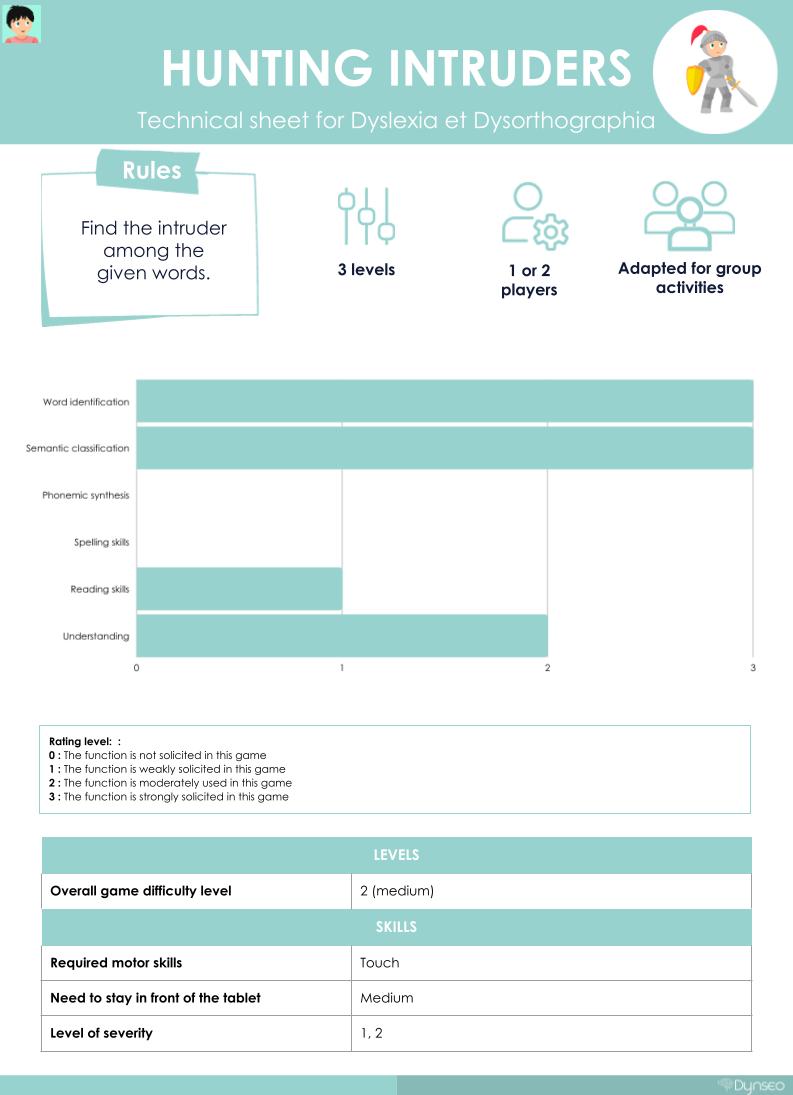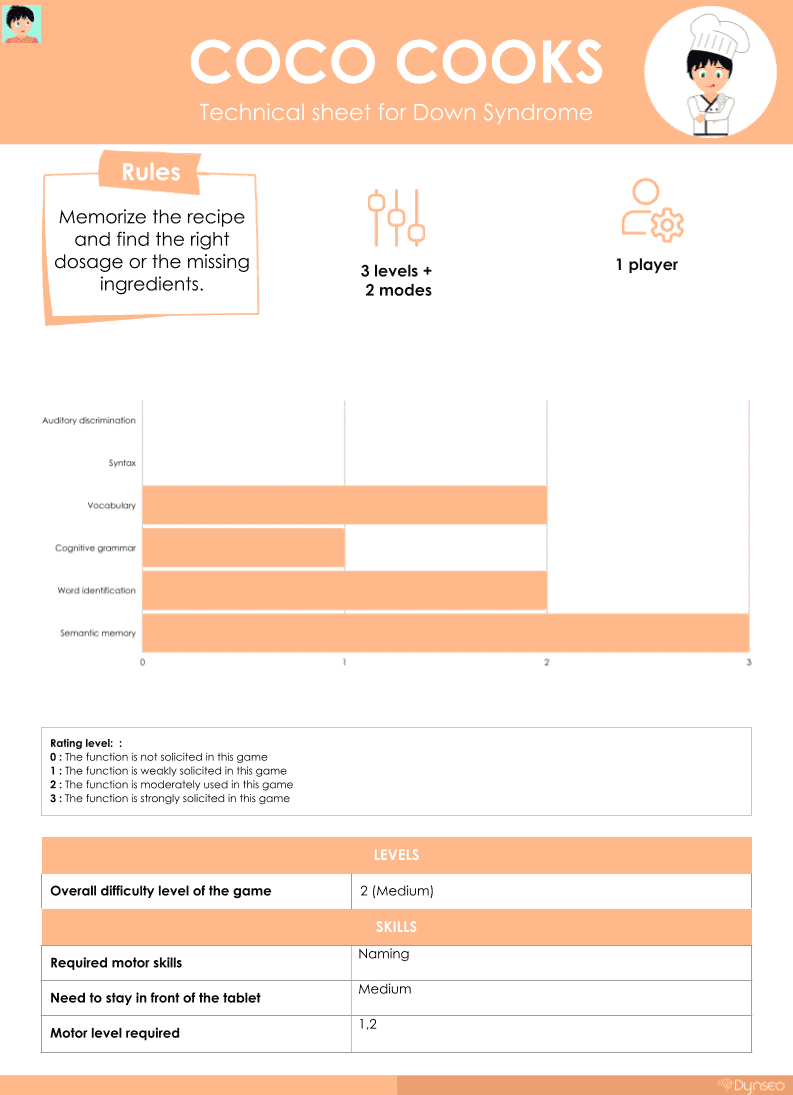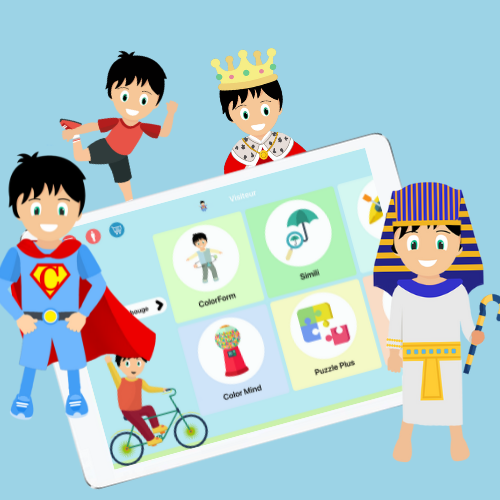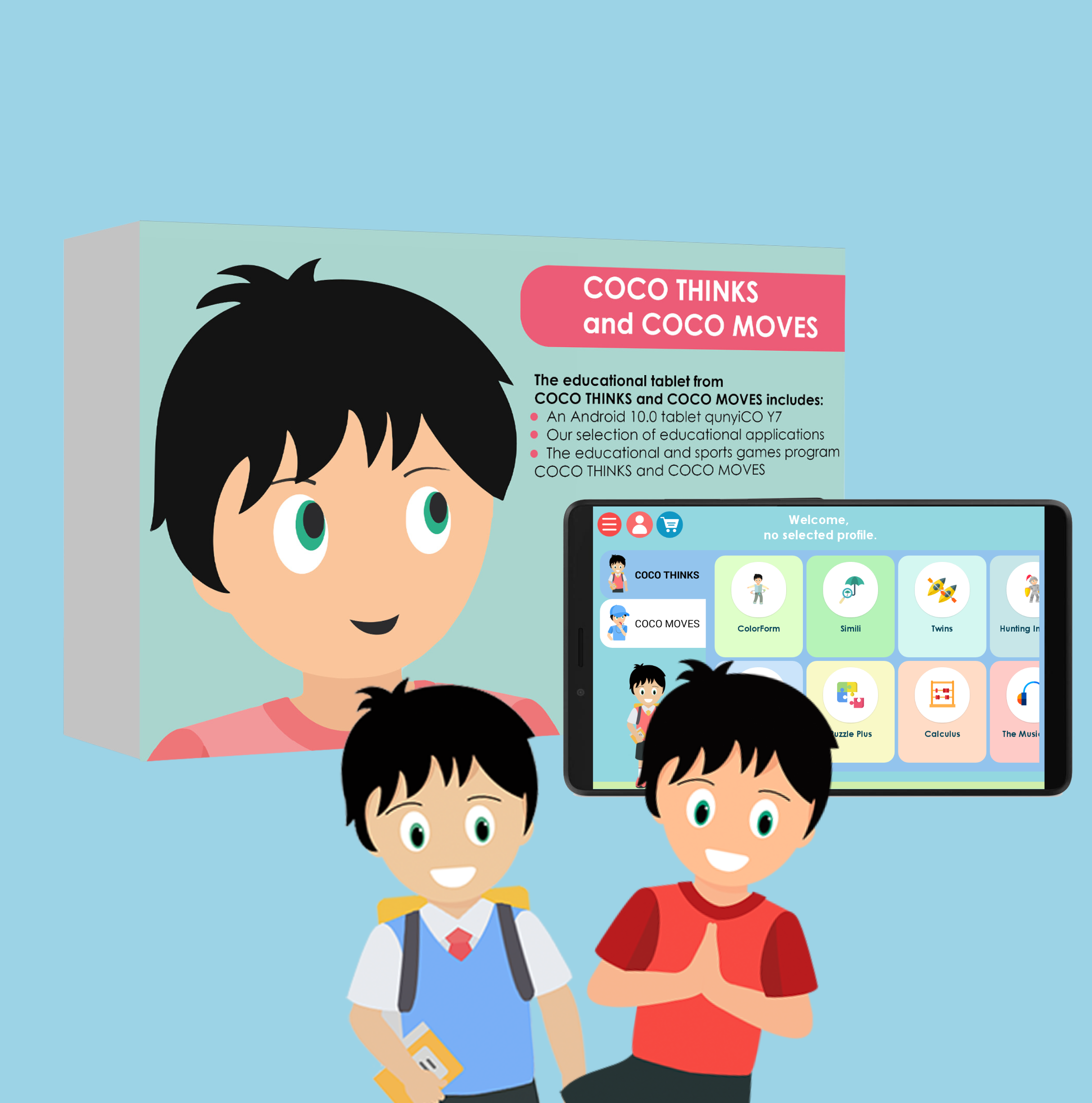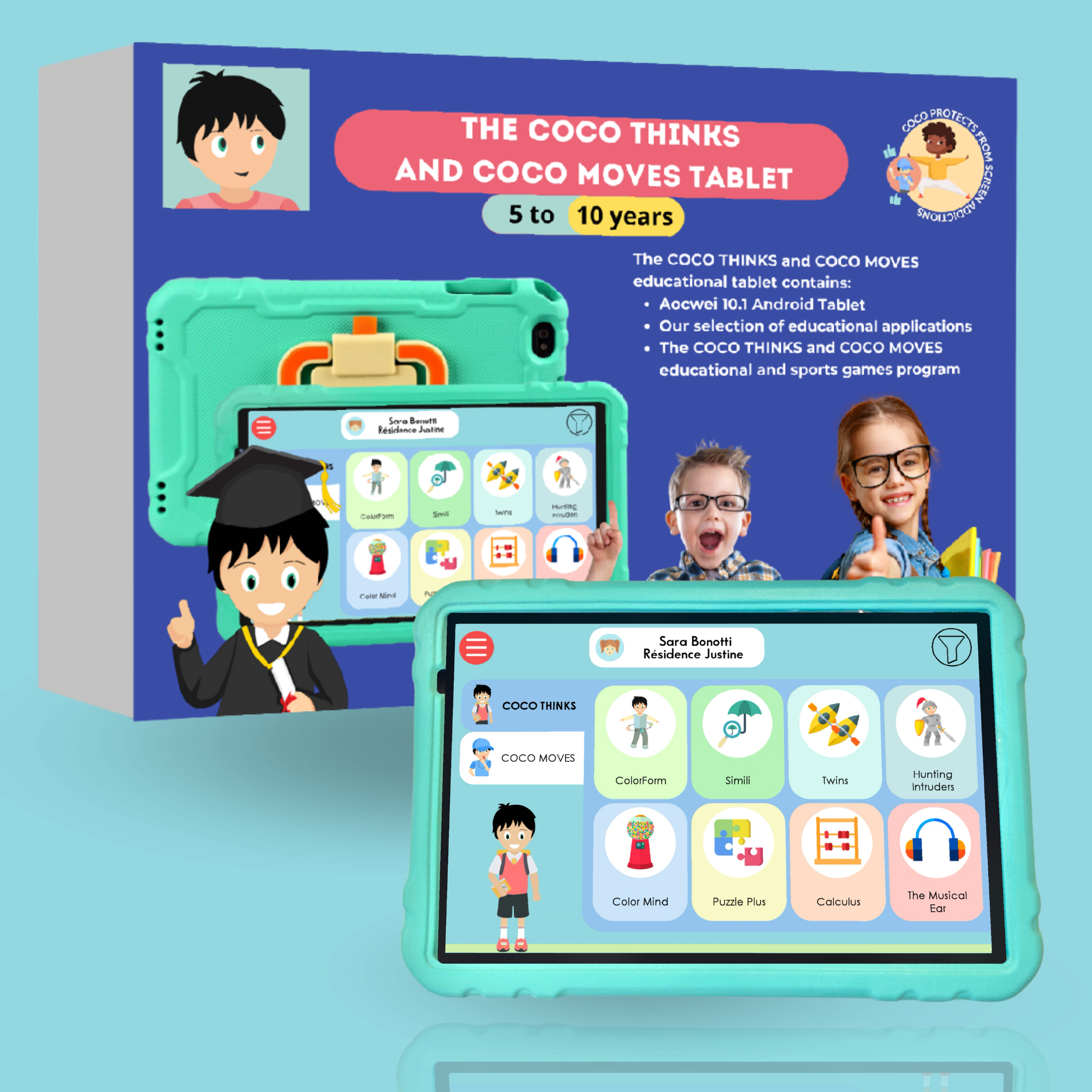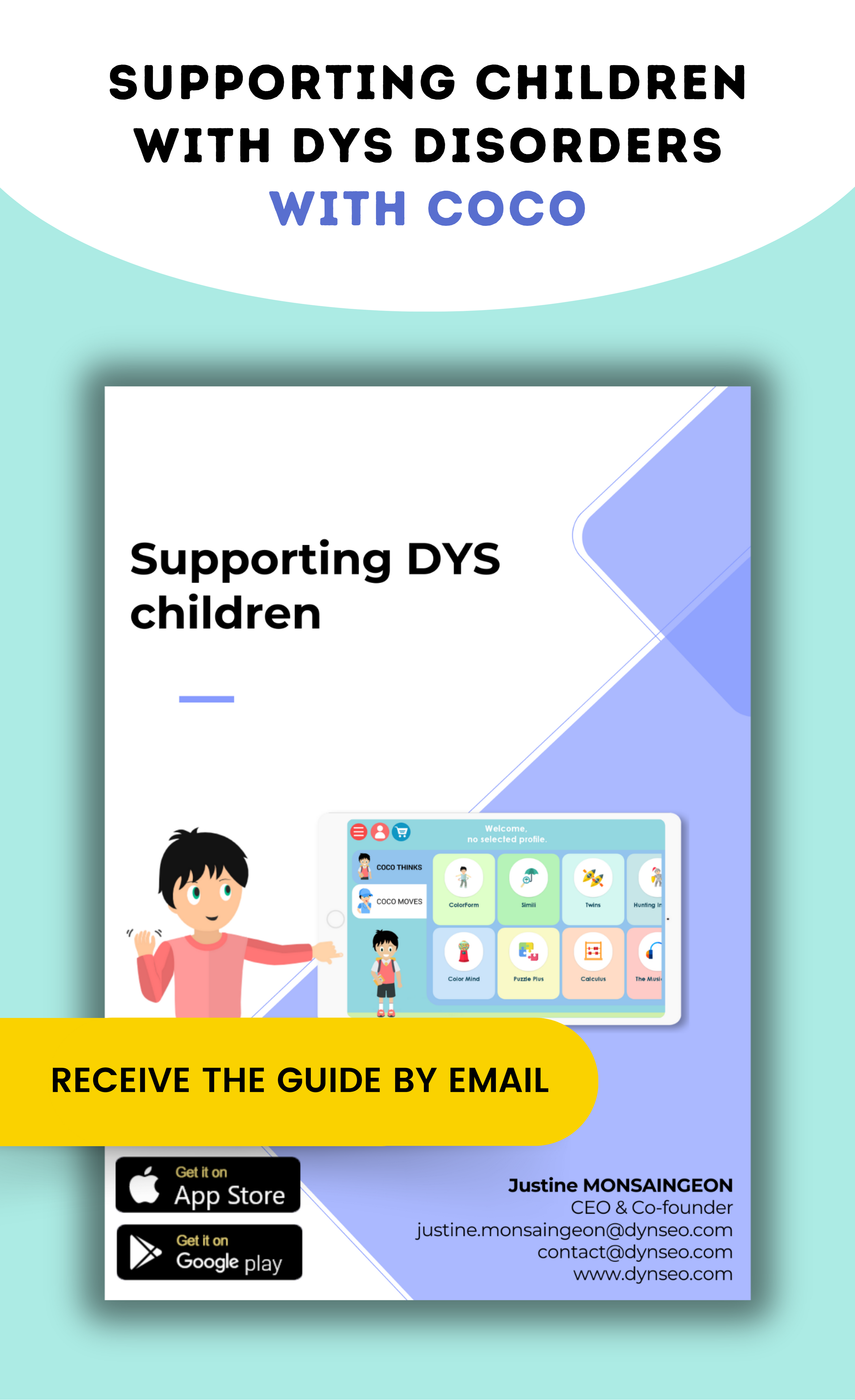Dynseo proposes
DYS disorders with COCO THINKS and COCO MOVES

Our educational and pedagogical games program COCO THINKS and COCO MOVES is widely used by DYS children, and we are proud to support all DYS disorders: dyslexia, dyspraxia, dysphasia, dyscalculia, … In this guide, you will find out which games to use according to each child‘s cognitive needs.
Our Coco educational game program was designed in collaboration with health professionals: occupational therapist, speech therapist, neuropsychologist, and psychometrician, and we are accompanied internally by Sara BONOTTI, our psychometrician.
Figures related to DYS disorders normally vary between studies, countries and time periods. In France we speak of 6 to 8% of dys disorders. It can be said that 4 to 5% of students in an age group are dyslexic, 3% are dyspraxic, and 2% are dysphasic.
Dyslexia,
Dysorthographia
Reading difficulties
Spelling errors
Slow reading rythm
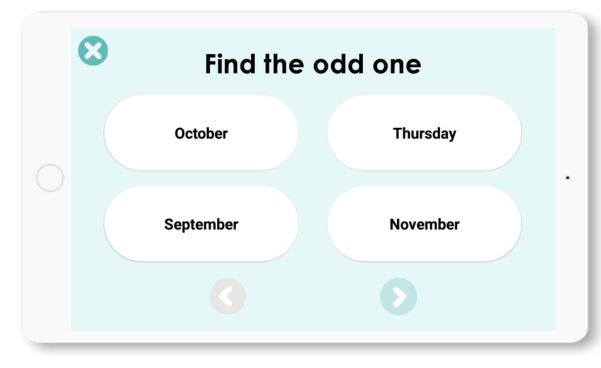
Dysphasia
Auditory discrimination
Limited vocabulary
Difficulty understanding phrasal construction
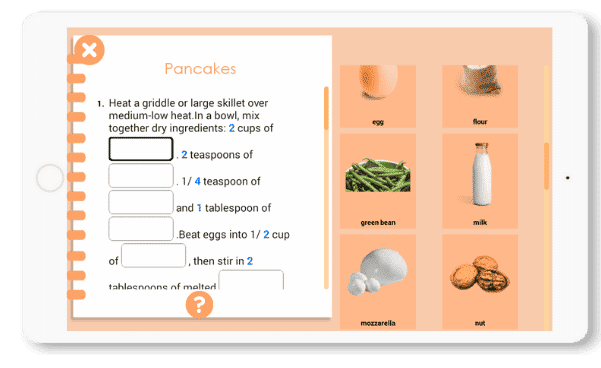
Dyspraxia
Difficulty in movement coordination
Weak visuo-spatial abilities
Difficulty in organization and sequencing
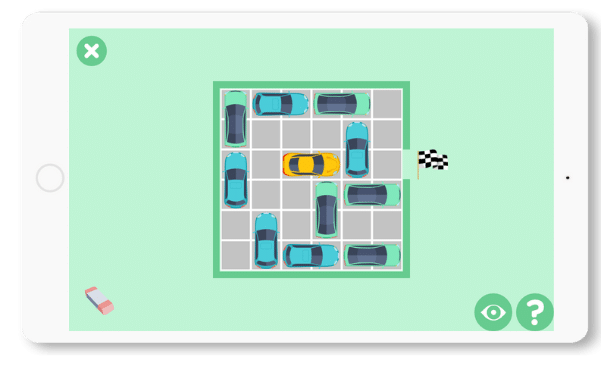
Dyscalculia
Difficulty for mental arithmetic
Difficulty with the numerical metric system
Weak visuo-spatial abilities
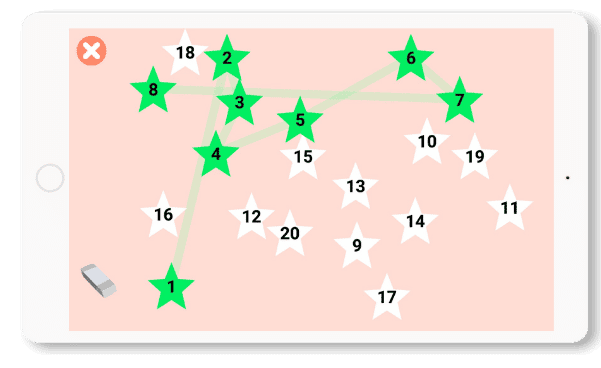
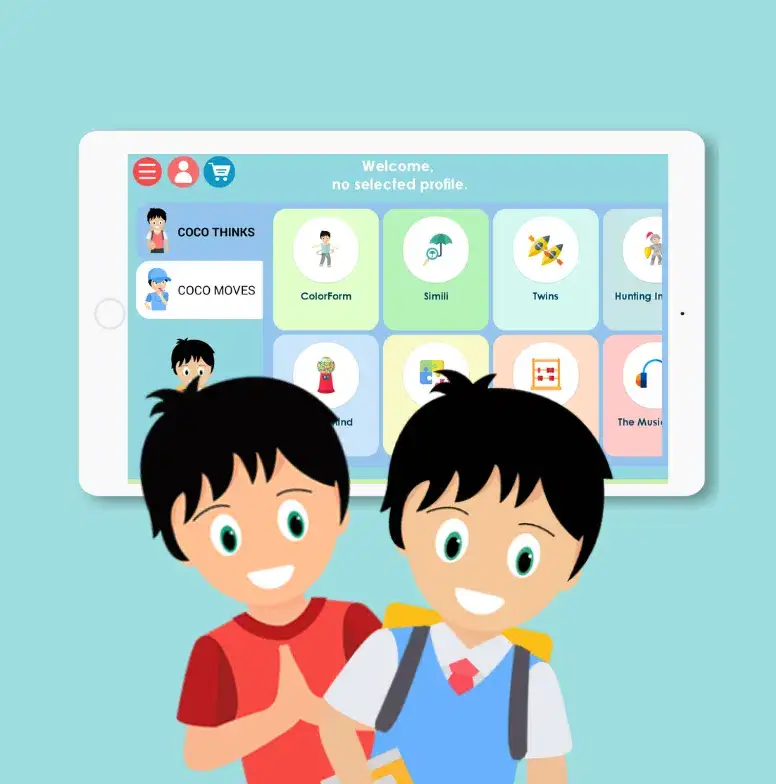
COCO, the app for children with DYS disorders
The program contains more than 30 varied educational games to work all the cognitive functions (attention, memory, comprehension…).
It offers the possibility to work on fine motor skills or to revise mental math, English, or geography.
Each game has 3 levels of difficulty to adapt to the needs and levels of each player, allowing them to progress at their own pace.
Finally, all our COCO THINKS and COCO MOVES games comply with accessibility standards, including audio instructions, to make it easier for children to understand and play independently.
In addition, we have developed the following features:
- the visual ergonomics to be uncluttered and intuitive,
- the colors and contrasts,
- The possibility of hiding sports games, so as not to set anyone up.

Games in the COCO THINKS and COCO MOVES program adapted for DYS children
Filters
to suit every Child’s needs
With COCO THINKS and COCO MOVES, children’s cognitive training moves up a gear: it is personalized, relevant, and without failure.
Our latest feature enables healthcare professionals and caregivers to improve children’s cognitive functions through engaging games, targeting pathologies such as ADHD, autism and learning disabilities.
What’s more, COCO THINKS and COCO MOVES emphasizes inclusiveness. It recognizes that every child is unique, and the application’s filters take into account the diversity of cognitive abilities and challenges children may face.
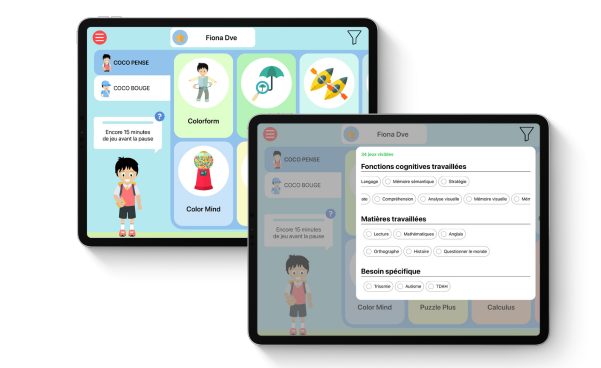
Possibility to filter the games dedicated to children with DYS disorders
IN THIS GUIDE
01.
Games adapted to dyslexia and dysorthographia
Dyslexia is a disorder of the ability to read, or a difficulty recognizing and reproducing written language.
03.
Games adapted to dyspraxia
Dyspraxia in children corresponds to a difficulty in carrying out certain voluntary gestures and actions. For example, it affects the ability to locate oneself in space and/or the coordination of movements.
05.
Monitoring the learning of DYS children
Monitoring the learning of children with dyscalculia requires an individualized approach, emphasizing adapted teaching methods and personalized support to promote their progress.
02.
Games adapted to dysphasia
Dysphasia is a specific disorder of speech and language development that results in the failure of normal receptive and/or expressive language acquisition.
04.
Games adapted to dyscalculia
Dyscalculia is a specific disorder of learning mathematics, affecting the ability to understand and manipulate numbers. It can lead to difficulties in arithmetic, numeration, and solving mathematical problems.
06.
BONUS: the benefits of a sports break for a child with a DYS disorder
Sports breaks provide dys children with a valuable opportunity to release stress, improve their self–esteem, and promote focus, which can have a positive impact on their academic performance and overall well–being.
I want to receive the complete guide to support children with learning disabilities with
COCO THINKS and COCO MOVES
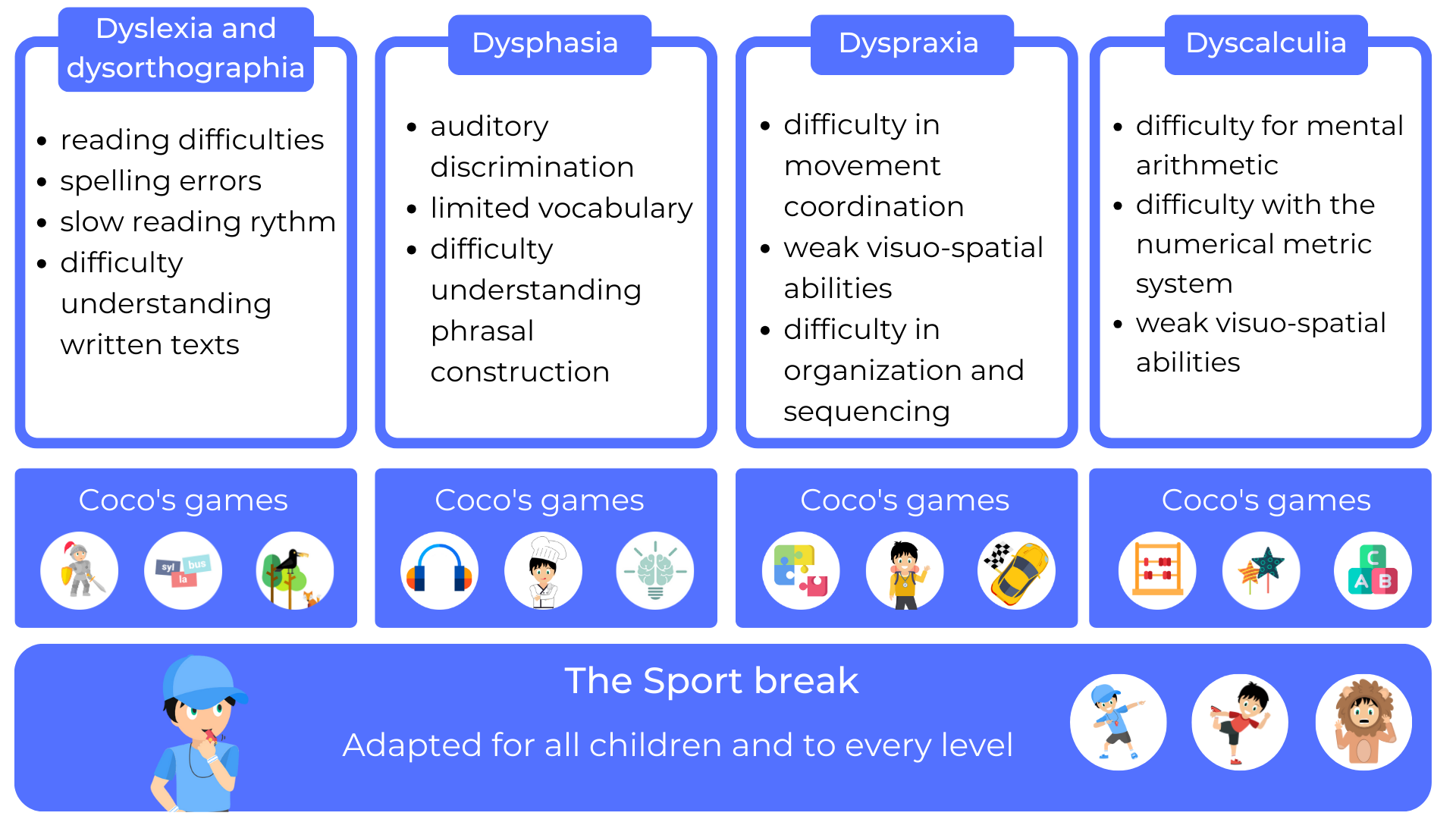

01.
GAMES ADAPTED TO DYSLEXIA AND DYSORTHOGRAPHIA
Dyslexia is a disorder of the ability to read, or a difficulty recognizing and reproducing written language.
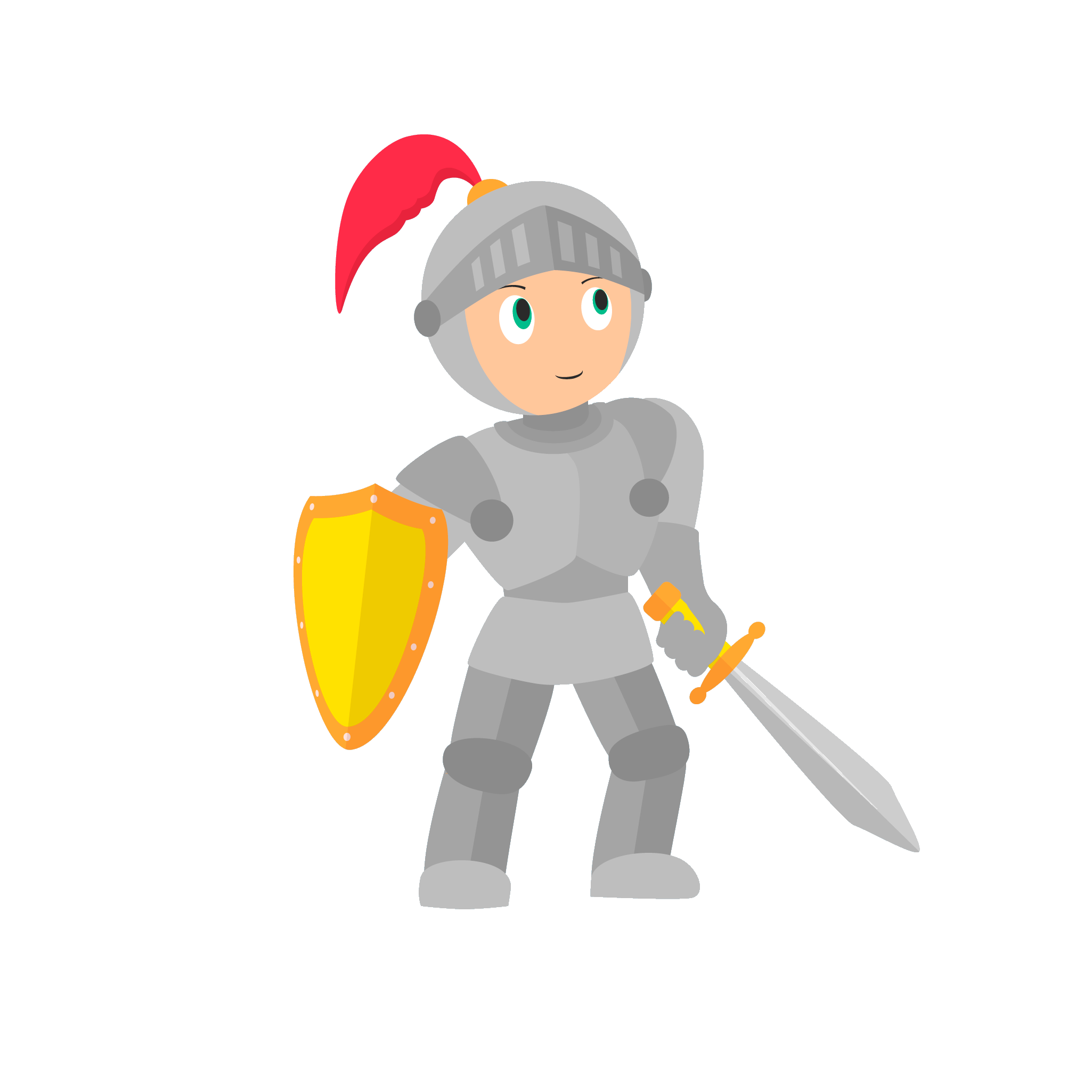
Hunting intruders
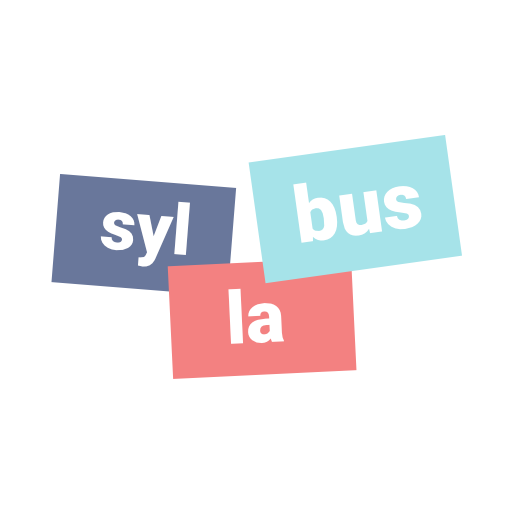
Syllabus
Here are our educational games adapted for DYSLEXIA and DYSORTHOGRAPHIA
Hunting Intruders
In this game, the child must find the intruder among the four words presented.
With this game, we work on the identification of words since the child must read the proposed words, recognize them, and give them a meaning.
In addition, the child works on semantic classification since the child must identify the category to which each word belongs.
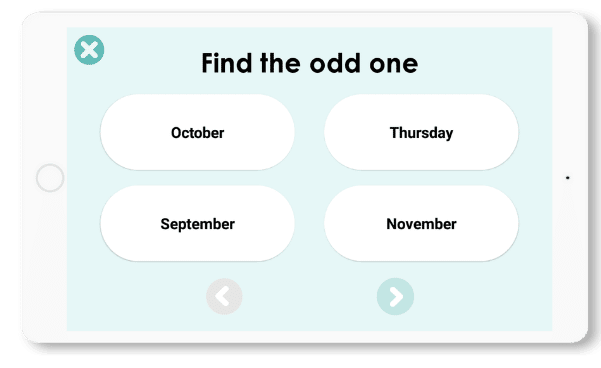
Syllabus
In this game the child must reconstruct words from syllables.
With “Syllabus” we work on phonemic synthesis and thus the skill required to put together syllables to reconstruct a word.
The child must recognize the syllables, combine them in the right order and find the right word. We also stimulate the spelling skills.
At the easy level, the child can see the words to be reconstructed, so we can also do the reverse work: from the word, the child must cut it into syllables and then go and find the right syllables among those proposed.
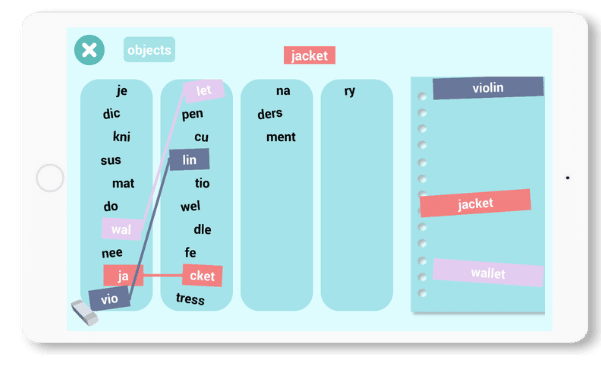
02.
GAMES ADAPTED TO DYSPHASIA
Dysphasia is a specific disorder of speech and language development that results in the failure of normal receptive and/or expressive language acquisition.

Musical ear
Brainstorm

Coco cooks
Here are our educational games adapted for DYSPHASIA
Musical Ear
In this game the child must listen to a sound, an animal or an instrument and identify it, choosing among the 4 propositions presented.
With this game we work on auditory attention and auditory discrimination.
In addition, the child must associate the sound with the correct object/animal/instrument, and by looking up the word in their vocabulary.
The presence of pictures next to the words allows these games to be used with children who are not yet able to read.
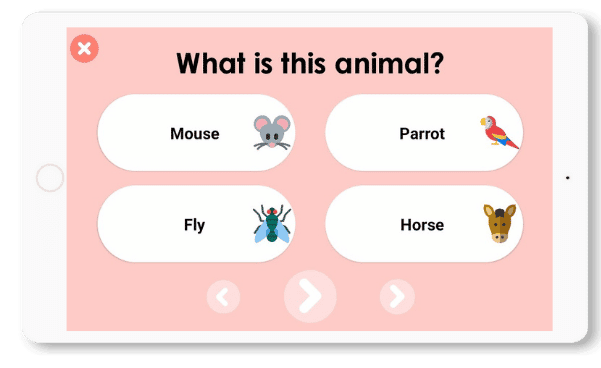
Brainstorm
In this game the child has to reconstruct a proverb from the given words.
With “Brain Storm” we work on word identification and syntax since the child must put the words in a coherent order (subject, verb, complement).
At the difficult level, the sentences are more complex, and sentence construction is also worked on.

Coco Cooks
In this game, the child must read a recipe or list of ingredients and memorize it.
With “Coco Cooks”, the child works on semantic memory and vocabulary.
In addition, in the “recipe” mode, the child must remember the different steps of the recipe: we can thus stimulate the construction of the sentence and the speech.

Many of the games in the COCO THINKS and COCO MOVES program are adapted for dysphasic children.
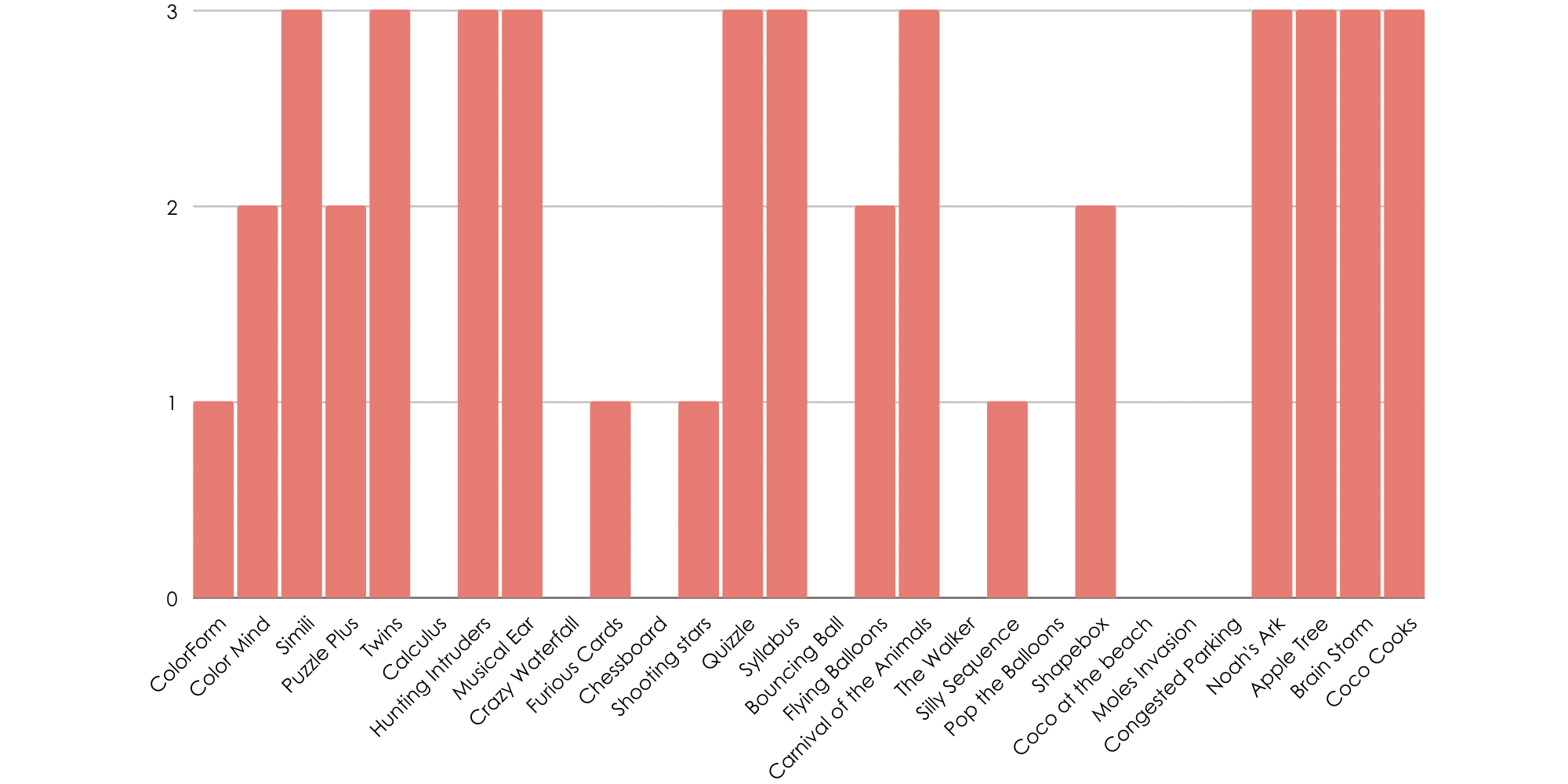
03.
GAMES ADAPTED TO DYSPRAXIA
Dyspraxia in children corresponds to a difficulty in carrying out certain voluntary gestures and actions. For example, it affects the ability to locate oneself in space and/or the coordination of movements.
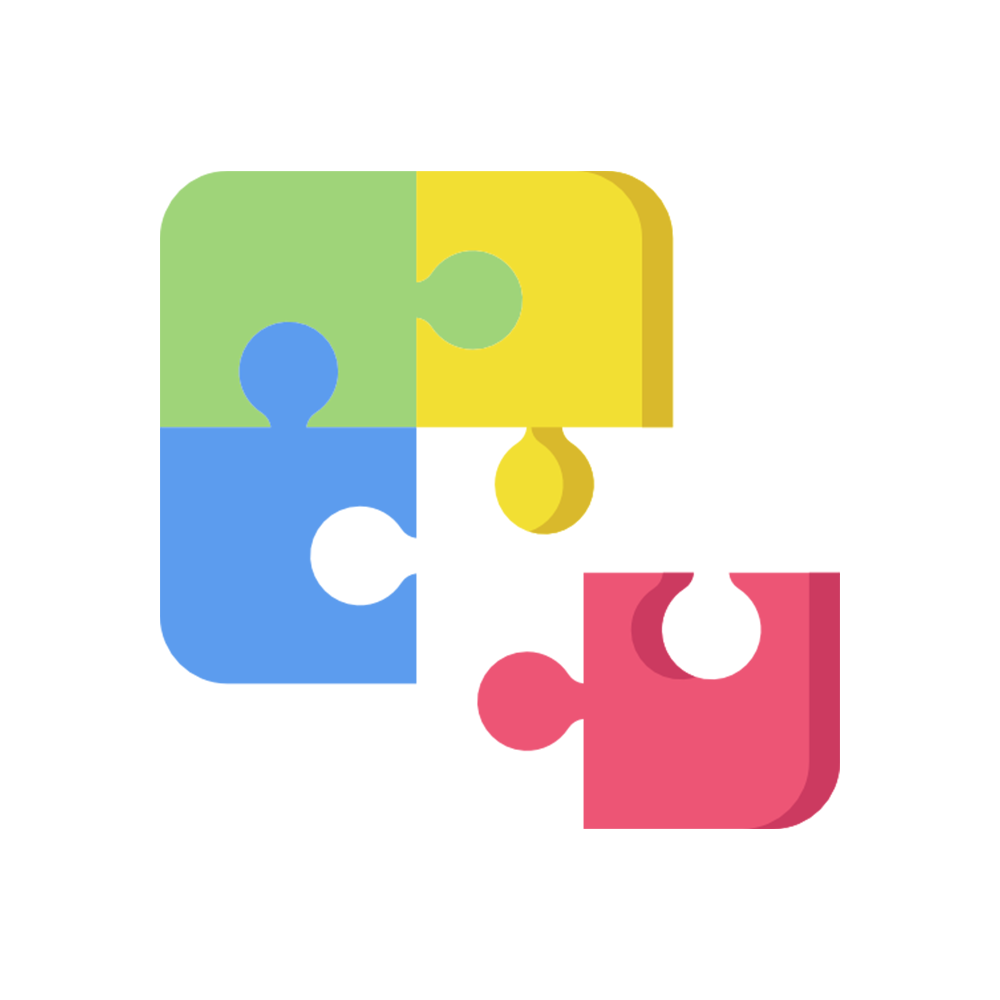
Puzzle plus

The walker

Congested Parking
Here are our educational games adapted for DYSPRAXIA
Puzzle Plus
In this game the child must compose a puzzle by moving the different pieces of the image present.
With “Puzzle Plus” we work on the visual-spatial skills to recognize the different parts of the picture and find the right position.
In addition, the child must organize the movements to be made, think about which piece to move first, and find strategies (start from the edge or start with the main character…).
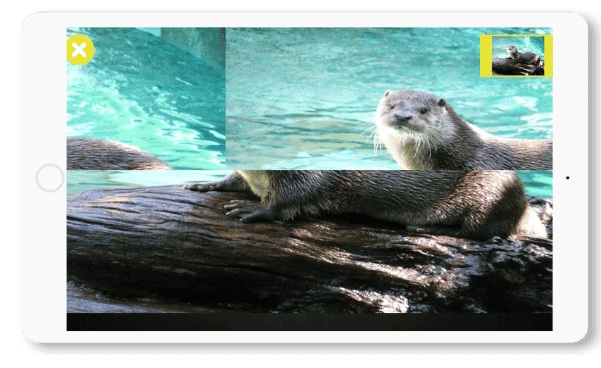
The Walker
In this game the child must place pieces on the board to create a path that takes Coco to reach his goal.
With “The Walker” we work on organization and sequencing to find the right order of the pieces.
The child will also need to use spatial organization skills to place the pieces in the right place and to create a mental image of the path to be built.
In addition, with the possibility of asking for clues (a piece will be placed in the right zone), the child will have to adapt to the positioned piece.

Congested Parking
In this game the child must move the cars on the screen to get the yellow car out of the parking lot.
With “Congested Parking”, we work on the creation of mental images to imagine the movements to perform.
Sequencing will also be stimulated since, to arrive to the solution, the movements must be linked in the right order.
With the possibility of asking to see the solution, the child will be able to memorize the sequence and we will work on the sequential memory.
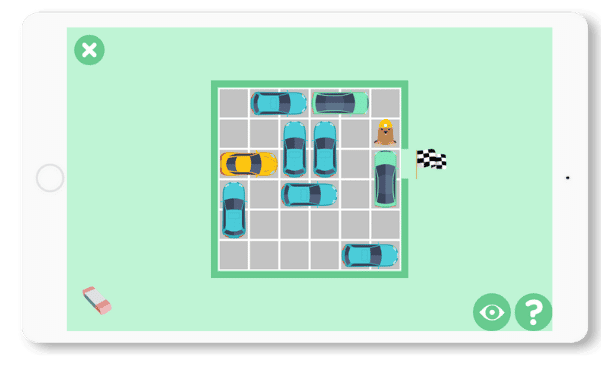
Many of the games in the COCO THINKS and COCO MOVES program are adapted for dyspraxic children.
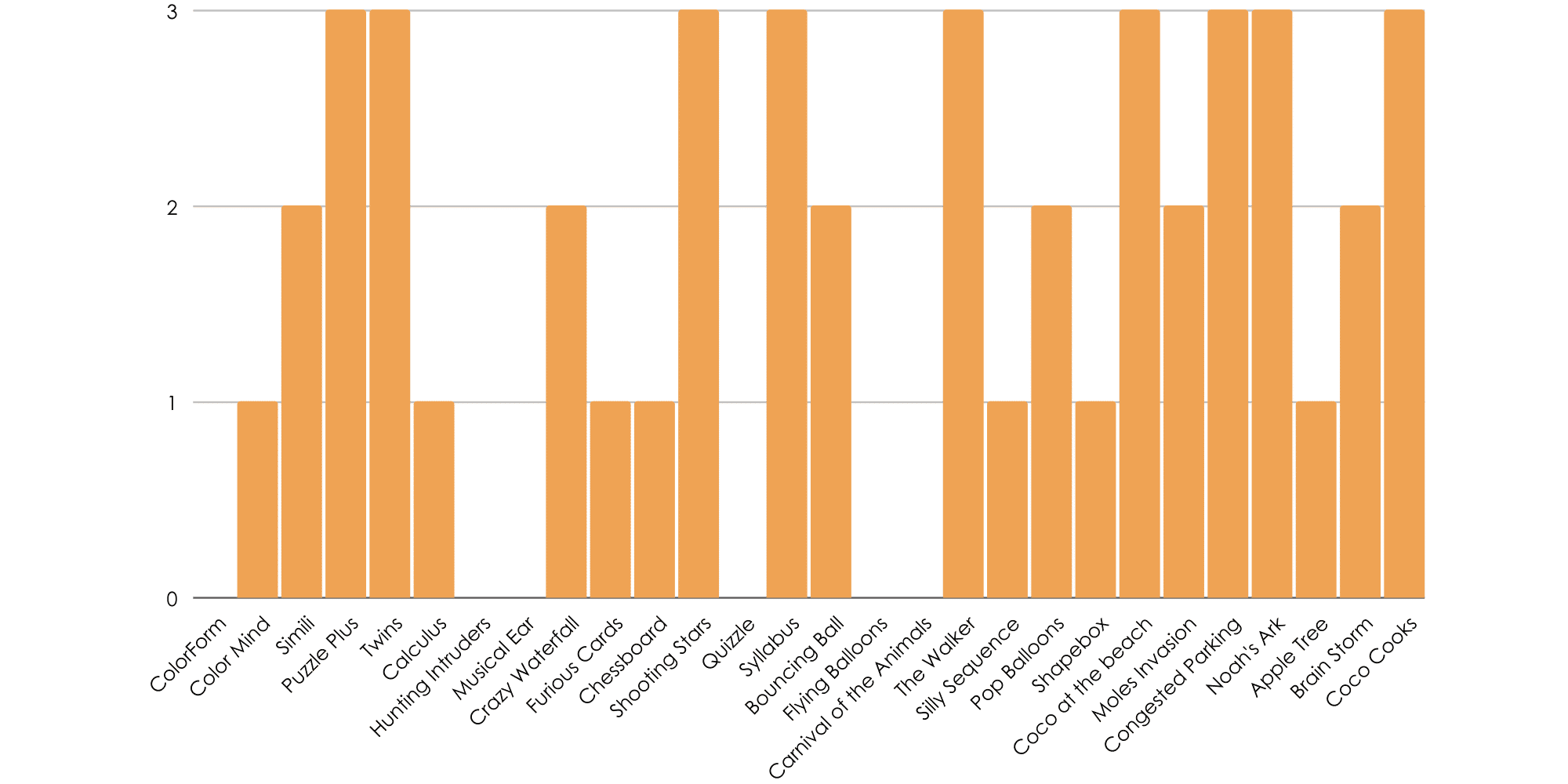
04.
GAMES ADAPTED TO DYSCALCULIA
Dyscalculia is a disorder of learning mathematics.
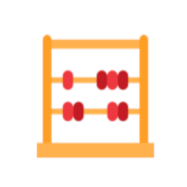
Calculus
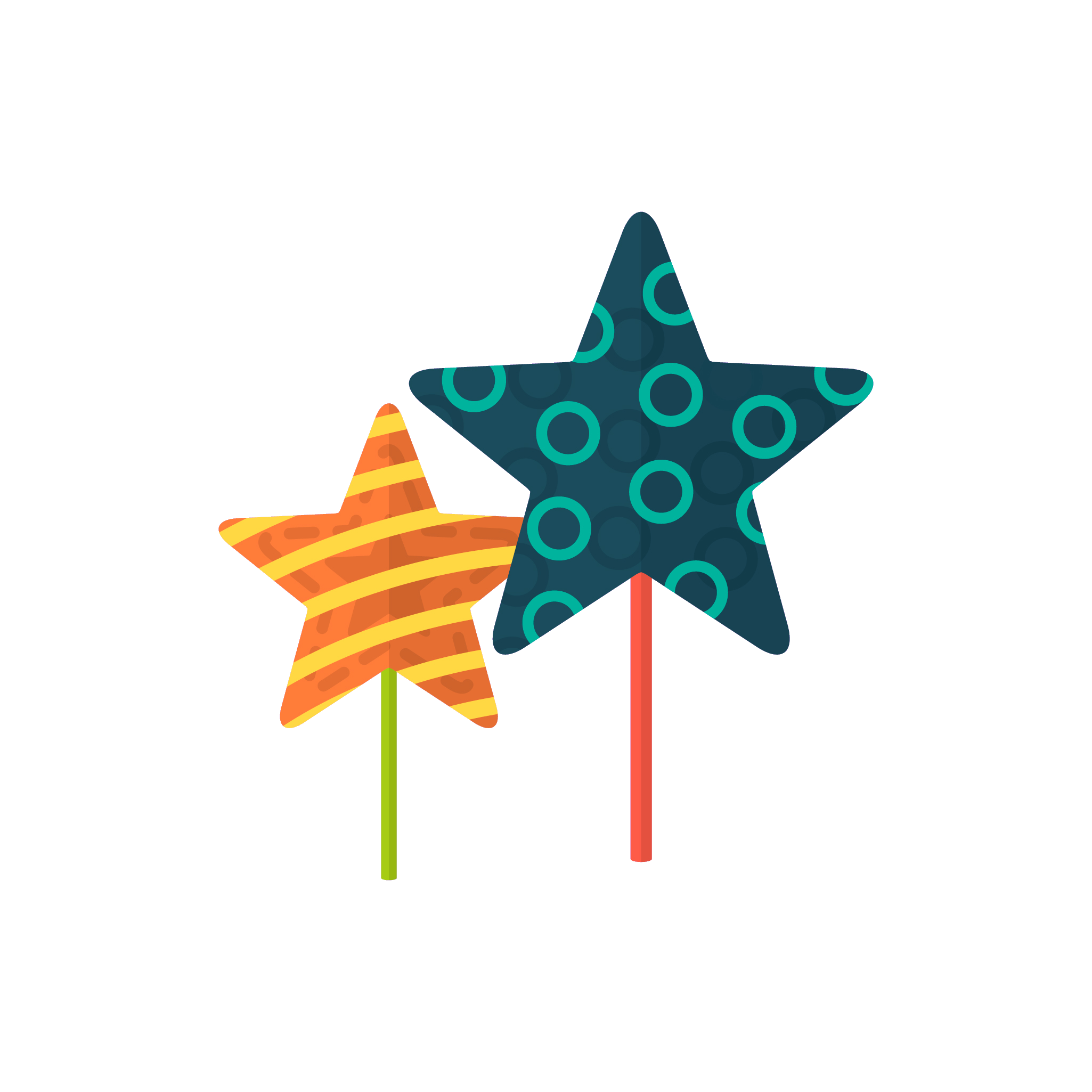
Shooting Star
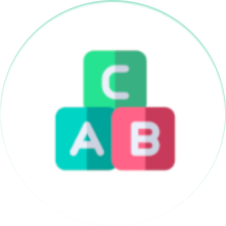
Silly Sequence
Here are our educational games adapted for DYSCALCULIA
Calculus
In this game the child must solve mathematical operations.
With “Calculus” you can work on mental arithmetic.
In the difficult level there are also divisions and multiplications to improve in the knowledge of multiplication tables.
In the “free response” mode, there are no propositions to choose from, so mental math will be more difficult.
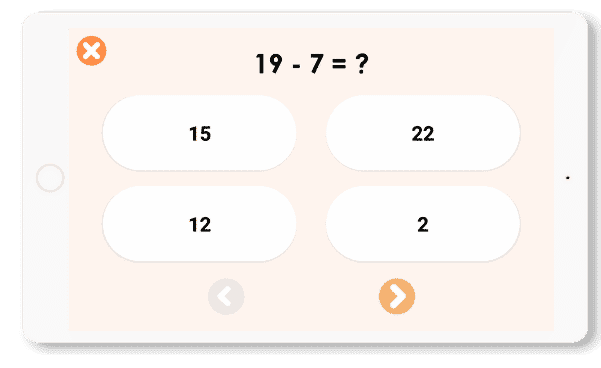
Shooting Stars
In this game the child must connect the stars in ascending order.
With this game we work on the recognition of numbers and the order of the numerical system.
In addition, the child must use his visual-spatial skills to find the right star.
At the difficult level, the child must alternate between numbers and letters (1, A, 2, B…) so he must switch between different codes and use his working memory.
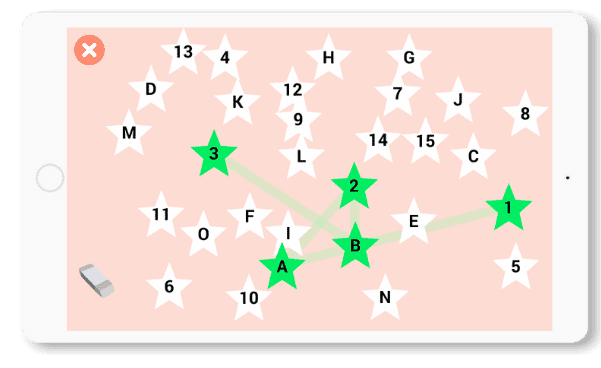
Silly Sequence
In this game the child must look at a series of numbers and say when a sequence of 3 consecutive numbers appears, knowing that it can be an ascending sequence, or a descending sequence.
With “Crazy Waterfall”, the child works on the recognition of numbers and the ability to find a sequence without starting from 0.
For example, when the number 23 appears, the child must remember this number, wait for the next number, and check if it is consecutive to 23 and do the same with the next number. In this way, working memory is stimulated.

Many of the games in the COCO THINKS and COCO MOVES program are adapted for dyscalculic children.
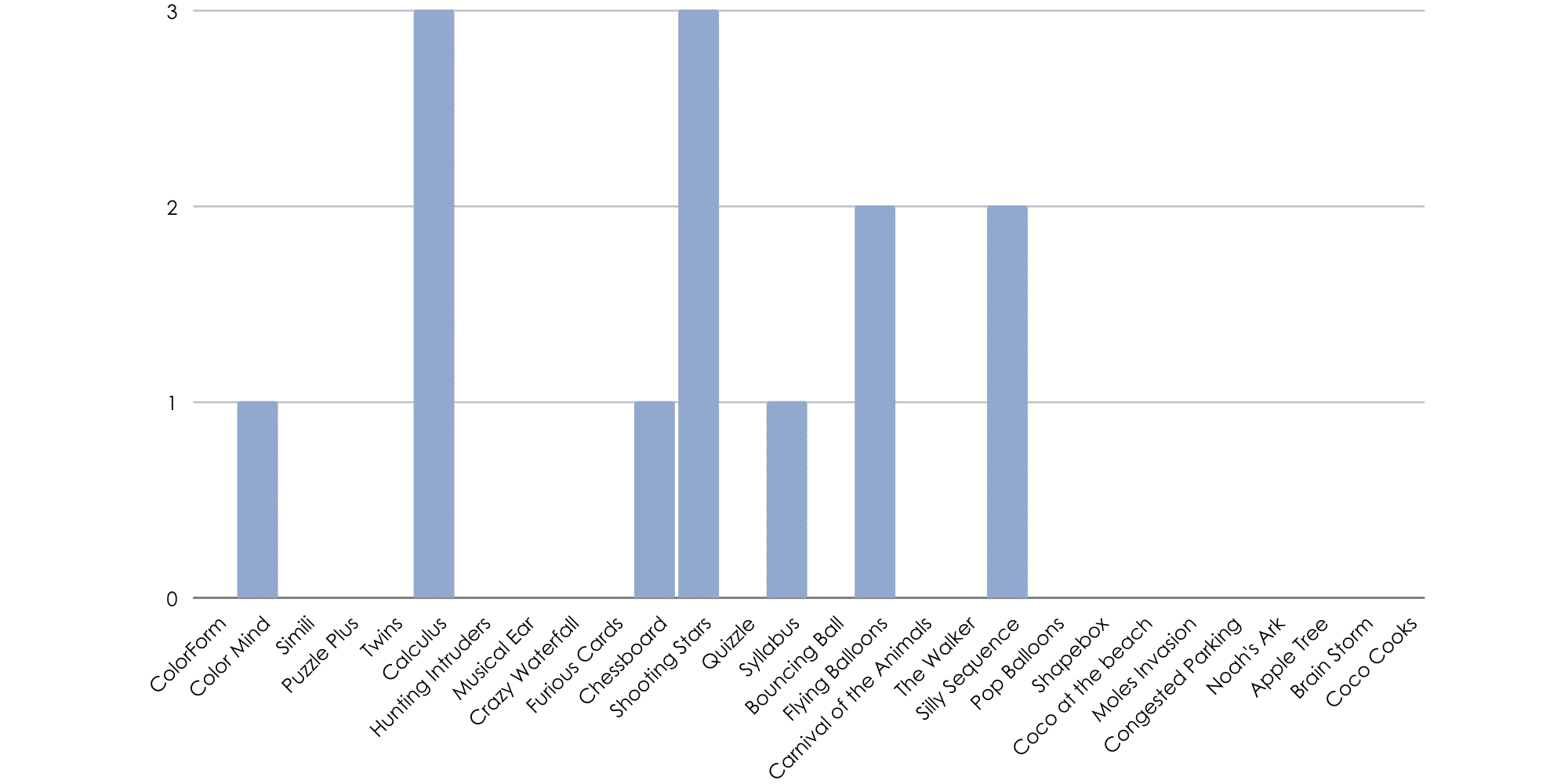
05.
MONITORING THE LEARNING OF DYS CHILDREN
Monitoring the learning of children with dyscalculia requires an individualized approach emphasizing adapted teaching methods and personalized support to promote their progress.

The Apple Tree
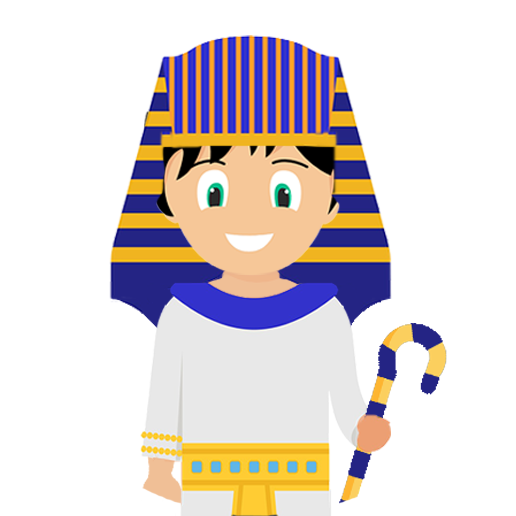
A Card A Date
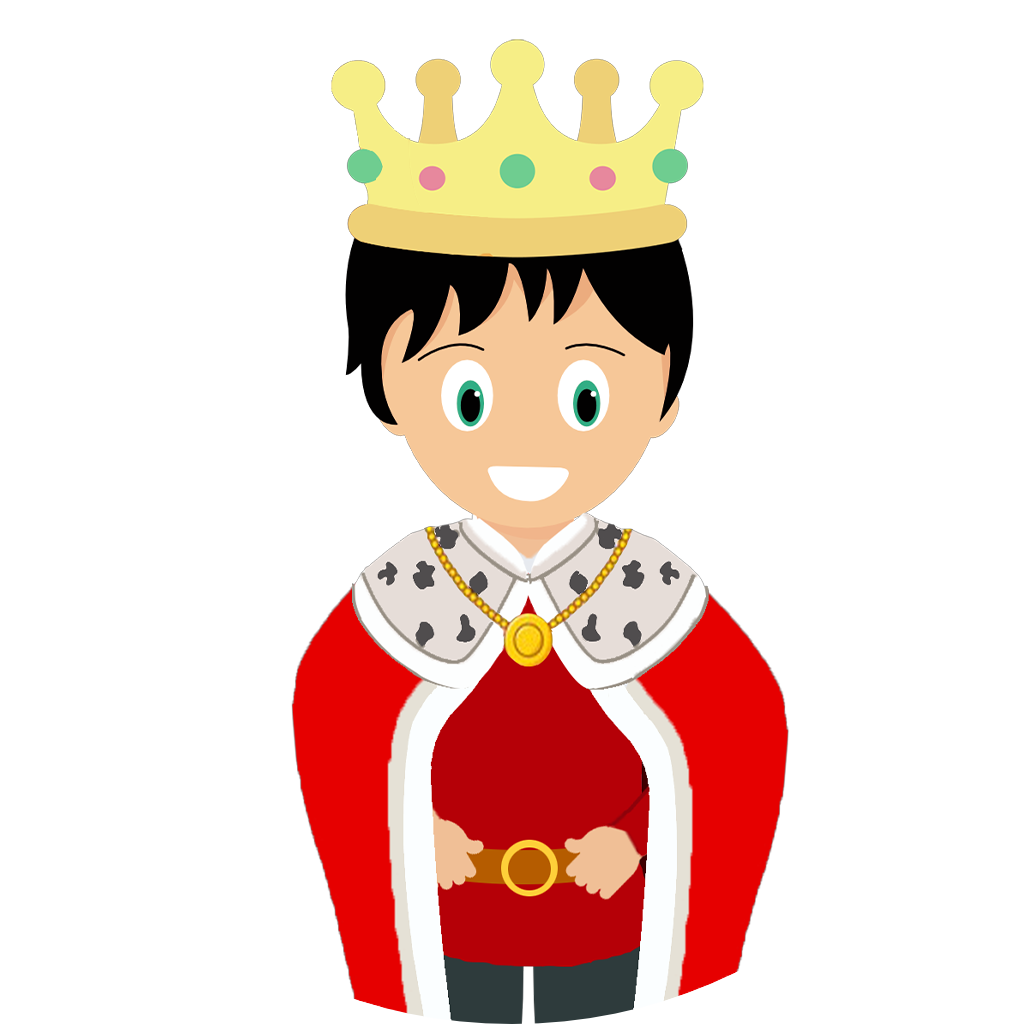
Quizzle
Assessment of the progress and acquisition of DYS children
Children‘s progress can be tracked in 2 different ways:
- The child can monitor his or her own progress,
- The teacher has access to a monitoring platform to monitor the children‘s progress, and to have access to resources, technical sheets and automatic analyses that will allow him to know which games are recommended according to the cognitive functions that need to be stimulated and therefore analyze the scores of each game, and thus be able to focus on the cognitive functions that are weaker and that need to be stimulated.
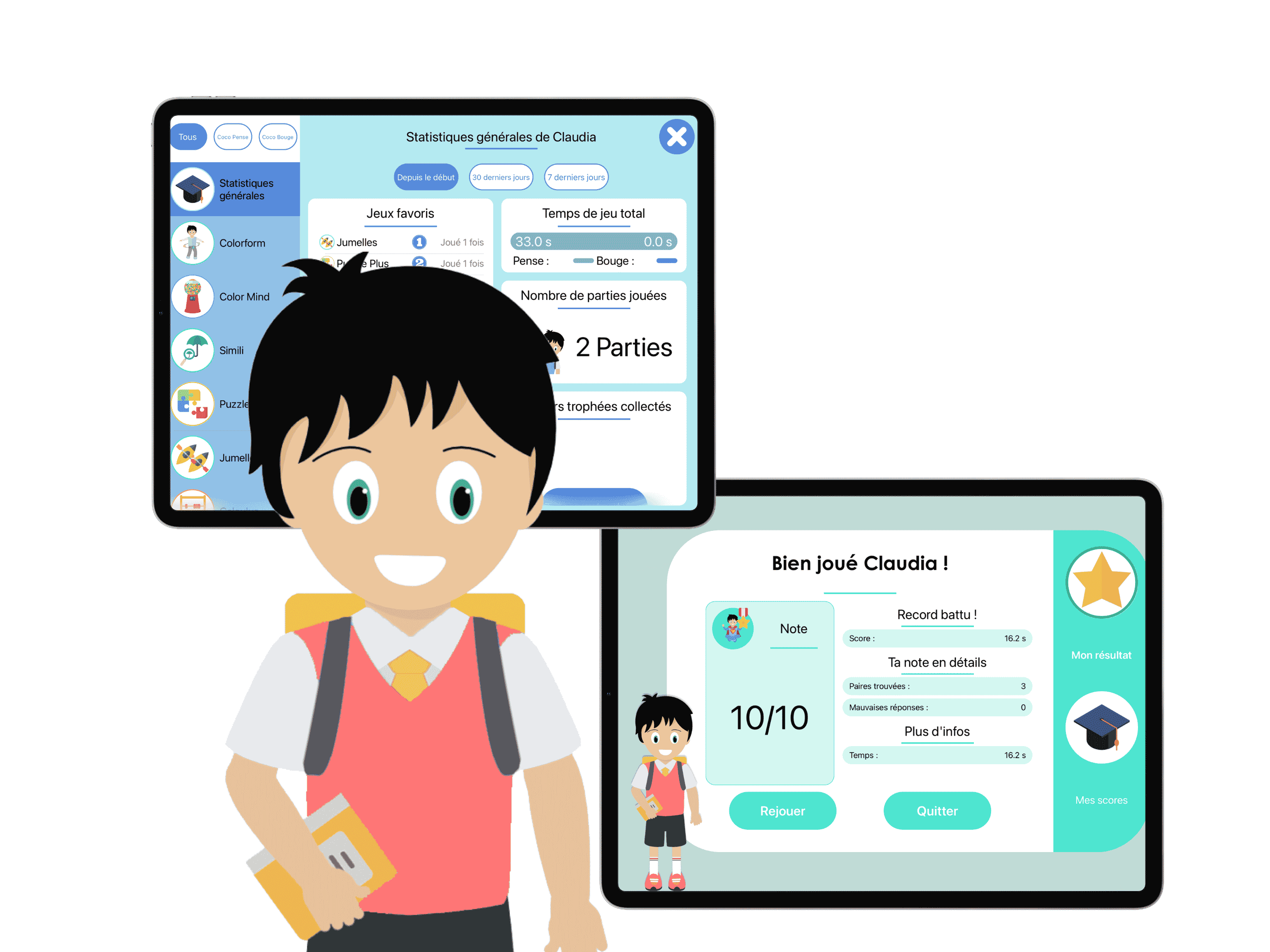
With the COCO THINKS and COCO MOVES program, children can create their own profile and take advantage of the thirty or so games available in the application.
When a student uses the app with their profile, they have the ability to see their progress in the app with:
- His/her favorite games,
- The levels of difficulty chosen,
- Points earned,
- The duration of the game.
The Apple Tree
In this game, the child has to find the chopped words.
The apple tree game can be helpful for children with a dys disorder, as it encourages concentration, spelling, and logic while providing a playful and interactive environment that can strengthen their reading and problem–solving skills. Additionally, the simple structure of the game can help build self–confidence and reduce learning anxiety.
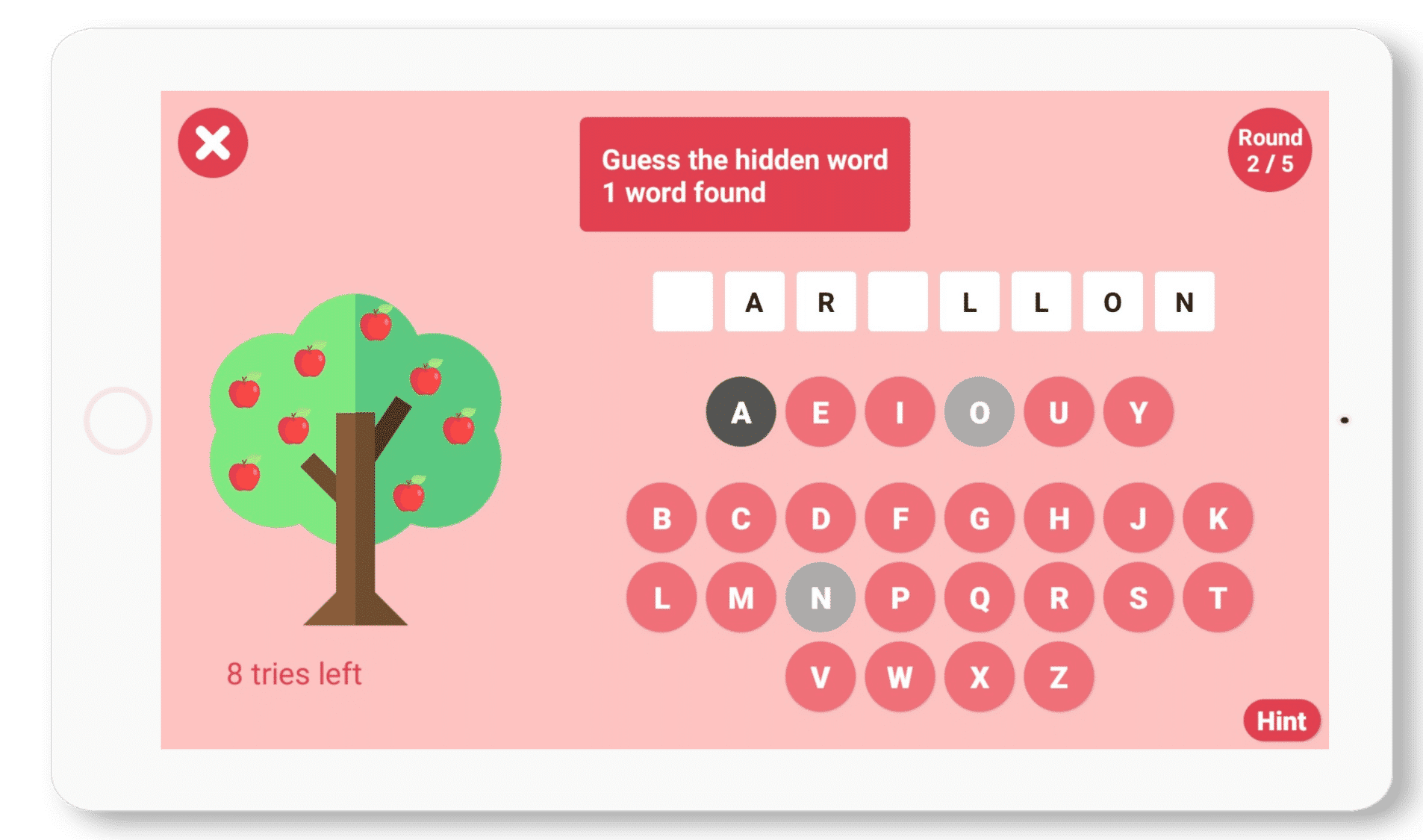
Quizzle
In this game, the child has to answer general knowledge questions, based on the school curriculum.
A quiz game can be beneficial for dys children because it provides an interactive and challenging way to learn, promoting engagement and remembering information. In addition, it helps build self–confidence by offering rewards for acquired knowledge, which can encourage motivation and enjoyment of learning.
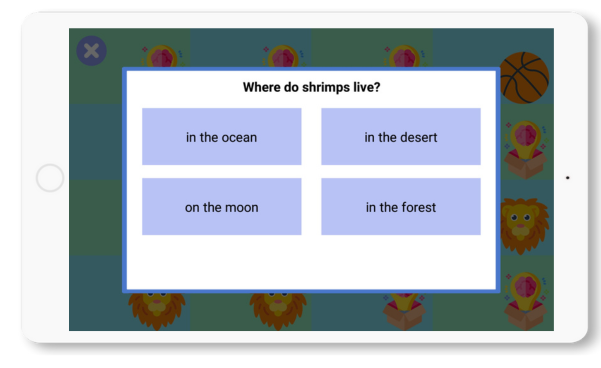
A card a date
In this game, the child has to put the events back in order.
A game that focuses on putting events back together is especially important for people with learning disabilities such as dyslexia, dyspraxia or dyscalculia. These disorders can affect the ability to mentally organize sequences of information chronologically or follow instructions in a specific order.
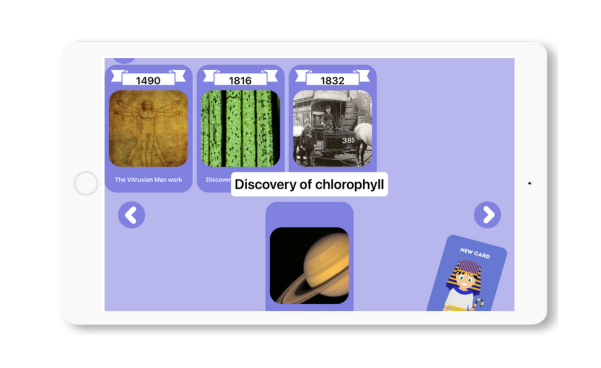
By providing a playful environment where players are encouraged to sort and rearrange events in a logical order, this type of game provides essential practice for building sequencing and temporal organization skills. By allowing dys people to exercise at their own pace in a non–stressful and engaging setting, these games help to improve their cognitive abilities and self–confidence, making it easier for them to participate and succeed in various areas of daily life, from education to professional life.
06.
A BENEFICIAL SPORTS BREAK FOR DYSLEXIC CHILDREN
The COCO app requires a sports break every 15 minutes of screen time. This allows them to work out, and then to be more focused!
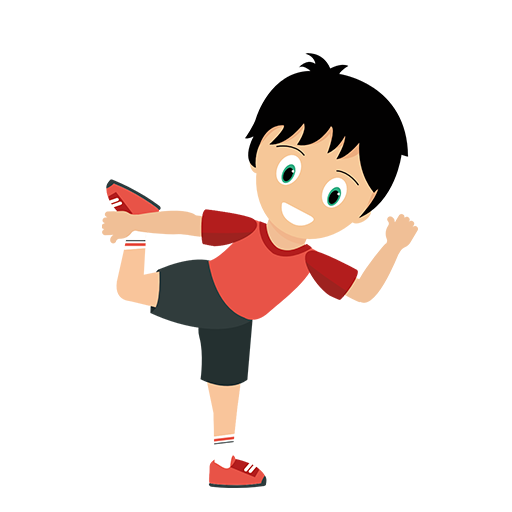
The Acrobat
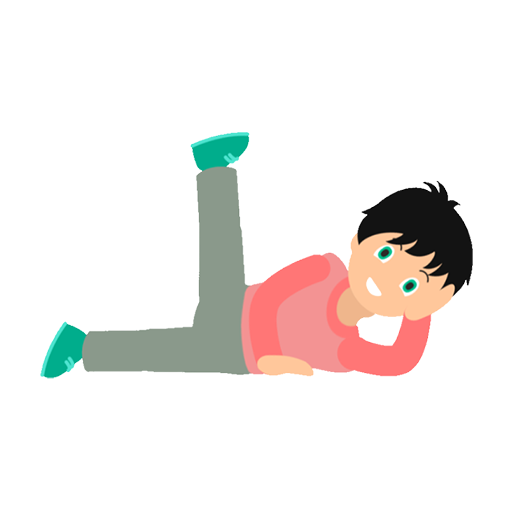
The yogi apprentice
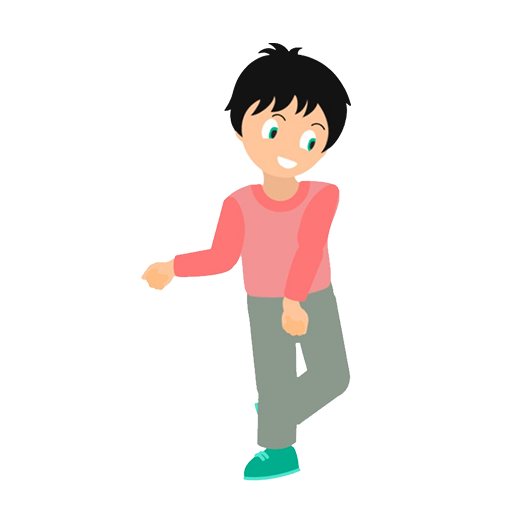
Dance with COCO
For children with DYS, doing an exercise requires more effort, especially in terms of concentration and attention. The brain is therefore overloaded and the child can get tired more quickly. It is therefore important not to reach the limit of concentration, and to do this you have to separate the exercises by taking regular breaks. Coco proposes breaks every 15 minutes of screen time to allow the child to air his brain, to rest, to better process the information received and to be more motivated for the next activity.
Moreover, Coco’s break is a dynamic break, which is very important for DYS children. During exercises, children tend to become rigid and tense, because the activities they are doing for them can be difficult. This sports break will allow the children to relax their bodies, reduce the tension of the exercises and thus improve their mood.
The acrobat
In this game, the child has to reproduce balance positions.
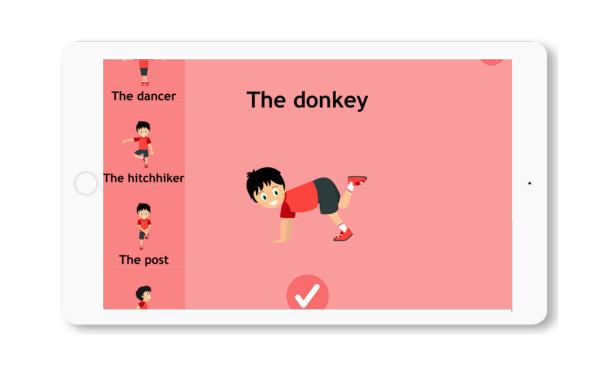
The importance of sport for dys children is manifold. In addition to the obvious physical benefits, sports activity provides a platform to develop social skills, build self–confidence, and promote concentration. For dys children, who can sometimes face additional challenges academically, sport offers an alternative means of success and fulfillment. By participating in sports activities, they can discover their strengths, develop coordination, and learn how to manage stress and anxiety. In addition, exercise promotes the release of endorphins, improving their mood and emotional well–being. In short, sport is much more than just a physical activity for dys children; It is an important pillar for their overall development.
Also, Coco‘s break is a dynamic break, which is very important for DYS children. During exercise, children tend to become rigid and tense, because the activities they are doing for them can be challenging. This sports break will allow children to relax their bodies, reduce tension related to exercise and thus improve their mood.
Physical activity has many benefits for children with learning disabilities such as dyslexia, dyspraxia, or dyscalculia. First, regular exercise helps improve motor coordination and proprioception, which can help alleviate difficulties related to dyspraxia, such as problems with balance and coordination of movements. In addition, physical activity stimulates blood circulation and promotes the release of neurotransmitters that are beneficial to the brain, which can improve concentration, memory, and cognition, aspects often affected in children with dyslexia. In addition, sport and group physical activities provide children with dyslexia with enriching social opportunities, promoting the development of social skills, self–esteem and self–confidence. Finally, regular physical exercise helps reduce stress and anxiety, problems frequently associated with learning disabilities, which can allow children with dyslusia to better manage their emotions and improve their overall well–being.
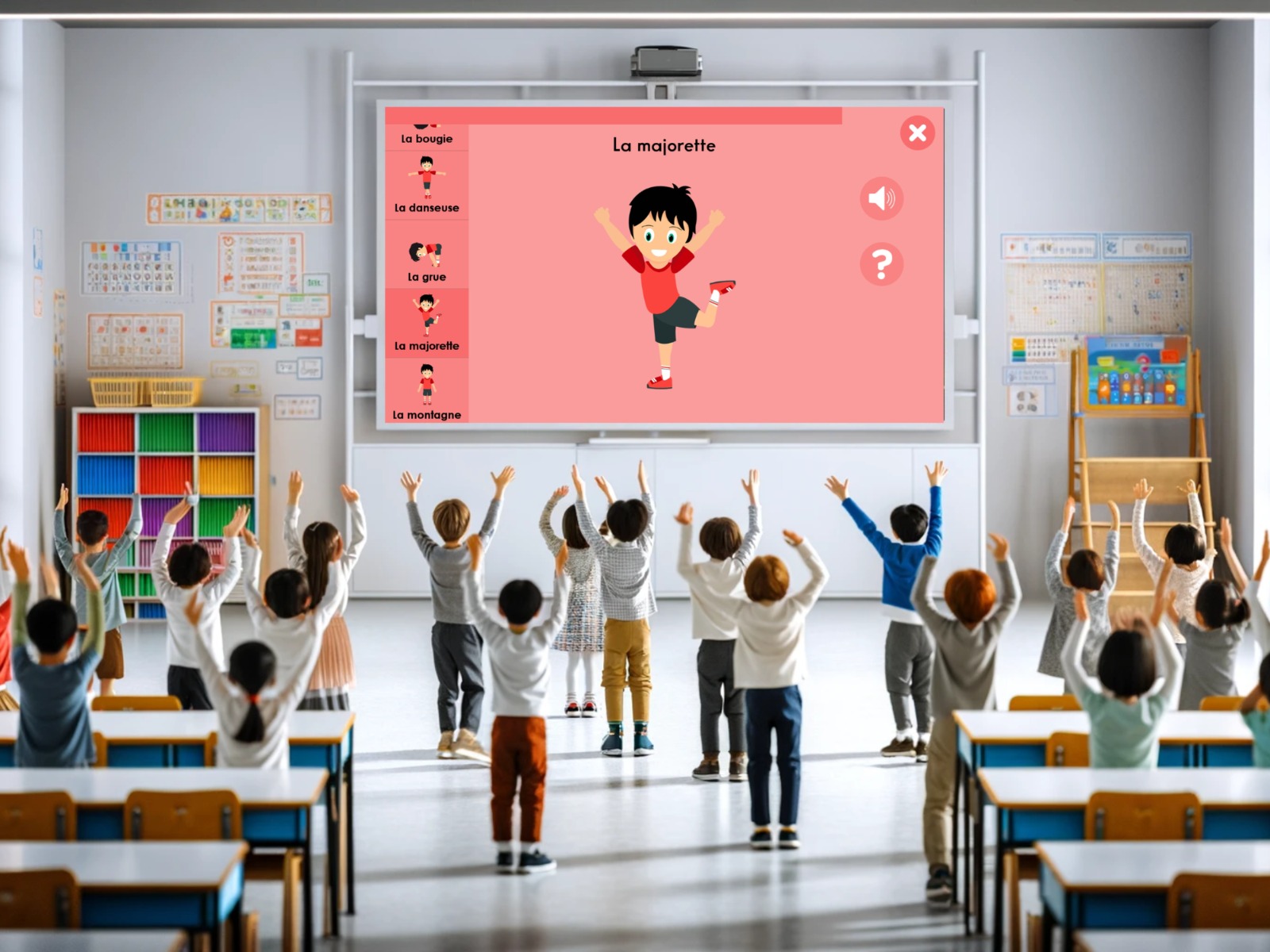
Here are all the technical sheets to accompany DYS children with the cognitive functions stimulated by play
Each user of COCO THINKS and COCO MOVES can ask for the data sheets to accompany a child with DYS by e-mail at coco@dynseo.com.
Here are all the technical data sheets for the games presented, with the cognitive stimulated by each game.
All users of the COCO THINKS and COCO MOVES programs can receive the data sheets by sending an email to coco@dynseo.com.


